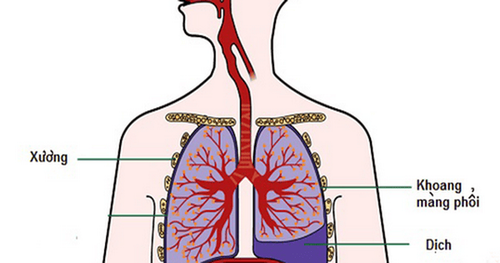Occasionally, you may experience sudden chills. According to experts, this is usually a normal occurrence. However, at times, sudden chills can signal an underlying medical condition. Therefore, if this symptom appears frequently, it is essential not to overlook it or take it lightly.
1. What is Sudden Chills?
So, What are Sudden Chills? It refers to the body’s mechanism of generating heat by causing muscles to repeatedly contract and relax. This process helps regulate body temperature to adapt to environmental conditions.
In some cases, sudden chills may be accompanied by other symptoms such as fever or shivering. If these symptoms occur periodically and persist for a short duration, it is advisable to consult a healthcare professional to identify any potential underlying conditions.
2. Causes of Sudden Chills
The exact cause of sudden chills may not always be identifiable. However, the following are some possible reasons for experiencing this sensation:
2.1. Viral Infections
One of the common causes of sudden chills is viral infection. When infected, the body’s immune resistance weakens, leading to symptoms such as fatigue, muscle aches, mild to severe fever, and chills. In such cases, the condition can often be managed at home by resting, maintaining good nutrition, and staying hydrated. Doctors generally advise against using antibiotics for viral infections as they are ineffective and may cause unwanted side effects.
2.2. Mononucleosis
Patients with mononucleosis may present with symptoms such as sudden chills, swollen lymph nodes, fever, and sore throat. This condition, caused by a virus, requires medical evaluation and treatment for complete recovery.
2.3. Chronic Fatigue Syndrome
In today’s fast-paced world, many people experience chronic fatigue syndrome due to work demands and life stresses. This condition is characterized by prolonged fatigue and tension lasting from six months to a year. Symptoms include persistent exhaustion, body aches, mild fever, chills, and difficulty in concentrating.
To alleviate this condition, individuals are encouraged to prioritize rest, relaxation, a balanced diet, and regular physical activity.
2.4. Autoimmune Diseases
Autoimmune diseases result from immune system dysfunction, where the body’s immune system attacks its own cells. These conditions often affect endocrine glands, the heart, and kidneys.

Symptoms of autoimmune diseases may include sudden chills, mild fever, cough, and joint or muscle pain. Diagnosing such conditions requires a medical examination and blood tests.
2.5. Hypothyroidism
A hallmark symptom of hypothyroidism is experiencing chills and body aches. This occurs when the thyroid gland fails to produce enough thyroid hormones, affecting metabolism and other bodily functions.
In addition to sudden chills, symptoms may include irregular heart rhythms, fluctuating blood pressure, sudden weight gain, and constipation.
2.6. Tuberculosis
Tuberculosis is a serious condition that affects health, causing symptoms such as persistent dry cough, high fever, muscle pain, chills, and difficult breathing. Treating this disease requires long-term use of antibiotics under medical supervision.
2.7. Influenza
The flu commonly occurs when the immune system is compromised. While most flu episodes resolve quickly without treatment if proper nutrition and rest are maintained, symptoms like mild fever, chills, nausea, and sore throat can still cause discomfort.
2.8. Pneumonia
Pneumonia is caused by bacterial or viral infections attacking the lungs. Symptoms include difficulty breathing, severe coughing, chest pain, and sudden chills.
Proper treatment involves adhering to a doctor-prescribed regimen, maintaining a healthy diet, and engaging in appropriate physical activity. It is also crucial to avoid smoking and harmful substances that affect lung health.
2.9. Vitamin B12 Deficiency
Vitamin B, particularly vitamin B12, plays a vital role in maintaining nerve function and promoting blood circulation. A deficiency in this nutrient can severely affect the body’s functions.
Symptoms of vitamin B12 deficiency include sudden chills, anxiety, stress, fatigue, mood disturbances, and musculoskeletal pain.
If chills are due to vitamin B12 deficiency, the condition can be improved by following a doctor-prescribed regimen, including vitamin B12 injections and consuming foods rich in this vitamin, such as eggs, dairy products, cheese, and red meat.
2.10. Side Effects of Medications
While medications treat illnesses, they may sometimes cause side effects, including chills, fatigue, and nausea. To avoid such issues, medications should be taken as prescribed by a doctor, avoiding overdosing or skipping doses.

If you still have questions about sudden chills, you can go to a hospital of Vinmec Health System for further examination and advice.
Vinmec International General Hospital is a high-quality medical facility in Vietnam with a team of highly qualified medical professionals, well-trained, domestic and foreign, and experienced.
A system of modern and advanced medical equipment, possessing many of the best machines in the world, helping to detect many difficult and dangerous diseases in a short time, supporting the diagnosis and treatment of doctors the most effective. The hospital space is designed according to 5-star hotel standards, giving patients comfort, friendliness and peace of mind.
To register for an examination at Vinmec International General Hospital, you can contact the nationwide Vinmec Health System Hotline, or register online HERE.
To arrange an appointment, please call HOTLINE or make your reservation directly HERE. You may also download the MyVinmec app to schedule appointments faster and manage your reservations more conveniently.













